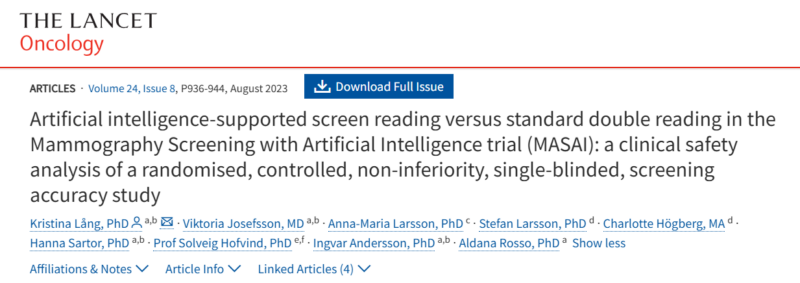Miguel Bronchud, Co-Founder of Regenerative Medicine Solutions, shared a post on LinkedIn about a paper by Kristina Lång et al. published in The Lancet Oncology:
“AI in breast cancer screening – we agree on the usefulness, but do we agree on the AI tools? Once prospective large trials are in progress, can new technologies and AI tools undergoing development further complicate decisions? Will comparative studies among these AI technologies be contemplated, or ever happen?
Retrospective studies have shown promising results using artificial intelligence (AI) to improve mammography screening accuracy and reduce screen-reading workload; however, only a few limited prospective studies have – to our knowledge – been published.
For example, almost two years ago a Swedish study by Kristina Lang et al. (The Lancet,2023) published:
They aimed to assess the clinical safety of an AI-supported screen-reading protocol compared with standard screen reading by radiologists following mammography.
In this randomised, controlled, population-based trial, women aged 40–80 years eligible for mammography screening (including general screening with 1·5–2-year intervals and annual screening for those with moderate hereditary risk of breast cancer or a history of breast cancer) at four screening sites in Sweden were informed about the study as part of the screening invitation.
Those who did not opt out were randomly allocated (1:1) to AI-supported screening (intervention group) or standard double reading without AI (control group).
Screening examinations were automatically randomised by the Picture Archive and Communications System with a pseudo-random number generator after image acquisition. The participants and the radiographers acquiring the screening examinations, but not the radiologists reading the screening examinations, were masked to study group allocation.
The AI system (Transpara version 1.7.0) provided an examination-based malignancy risk score on a 10-level scale that was used to triage screening examinations to single reading (score 1–9) or double reading (score 10), with AI risk scores (for all examinations) and computer-aided detection marks (for examinations with risk).
AI-supported mammography screening resulted in a similar cancer detection rate compared with standard double reading, with a substantially lower screen-reading workload, indicating that the use of AI in mammography screening is safe.
The trial was thus not halted and the primary endpoint of interval cancer rate was planned to be assessed in 100 000 enrolled participants after 2 years of follow-up.
Now The Lancet also announces that UK’s National Health Service (NHS) has launched the world’s largest prospective trial of using artificial intelligence (AI) to assess routine mammogram screenings. Nearly 700 000 women who have booked routine screenings in the UK will be invited to participate from April, 2025.”
Authors: Kristina Lång, Viktoria Josefsson, Anna-Maria Larsson, Stefan Larsson, Charlotte Högberg, Hanna Sartor, Solveig Hofvind, Ingvar Andersson, Aldana Rosso.

More posts featuring Miguel Bronchud.


